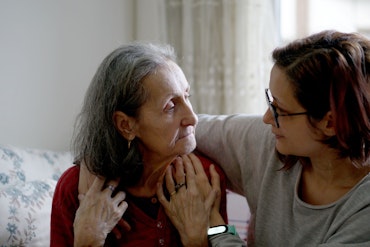Aged care workers experiencing rental crisis exacerbated by COVID-19
COVID-19 essential workers, such as the aged care workforce, are facing a rental affordability crisis with most workers in major cities putting a large portion of their weekly pay towards their rent.
![<p>78 geographic regions in Australia would require an essential worker to spend between one-third or two-thirds of their weekly wage towards renting an apartment. [Source: Shutterstock]</p>](https://agedcareguide-assets.imgix.net/news/articles/2_8_2021-AC-workers-rental-crisis.jpg?fm=pjpg&format=auto&w=550&q=65)
78 geographic regions in Australia would require an essential worker to spend between one-third or two-thirds of their weekly wage towards renting an apartment. [Source: Shutterstock]
Everybody’s Home, the national campaign against homelessness, utilised available rent data and compared that against the basic hourly wage of essential workers, including aged care and disability support workers, and have released their findings to mark the start of National Homelessness Week, 1 – 7 August 2021.
Areas that aged care workers were likely to sacrifice over two-thirds of their weekly wage (hours worked to pay rent) are:
Australian Capital Territory: South (26.8 hours), North (29.1 hours), Inner South (26.1 hours), Inner North (27.3 hours).
New South Wales: Sydney CBD (32.4 hours), Northern Beaches, 28.5 (hours), Lower North Shore (28.7 hours), Eastern Suburbs (27.2 hours)
Queensland: Gold Coast South (27.3 hours), Gold Coast North (25 hours)
National spokesperson for Everybody’s Home, Kate Colvin, says that the Australian housing system is not supportive or working for normal Australians.
“The pandemic has reminded us how critically important our carers and service workers are. Yet these pandemic heroes are being badly let down by the housing system and are often priced out of the communities they serve,” explains Ms Colvin.
“While eye-watering rents are worst in our major cities, essential workers are increasingly priced out of coastal and bush communities too. People with big city incomes are moving to the regions and totally warping the rental markets.
“It’s astonishing that a care or service worker simply could not afford a modest apartment in the overwhelming majority of our suburbs and regions.”
Rental analysis has found that a further 78 geographic regions in Australia would require an essential worker to spend between one-third or two-thirds of their weekly wage towards renting an apartment.
COVID-19 has made it difficult for aged care workers to pay their rent as the coronavirus has created new barriers to working for essential employees.
Many in the aged care workforce were not able to work across multiple facilities when the Government banned the practice for COVID-19 hot spots or outbreaks, in a bid to prevent COVID-19 spread between nursing homes.
This was increasingly problematic for a workforce that is largely casual and relies heavily on working between multiple aged care sites to make their money.
Adding to this pain, casual aged care workers don’t receive the same benefits as part or full time workers, like sick leave.
The lack of sick leave left many either to isolate or quarantine for COVID-19 without pay or encouraged workers to continue working whilst sick, which was further endangering older people in aged care.
Adding to this, the Government recently mandated COVID-19 vaccines for aged care workers with a deadline of September. However, concern was raised that workers would leave the sector if the vaccine was made mandatory.
With the deadline approaching for the aged care workforce to be vaccinated, but no Government plan to get those vaccines in arms, there are concerns that a portion of aged care workers will be left without work and pay because they cannot get the vaccine in time.
Ms Colvin says, “We must expand social and affordable housing. This will relieve the pressure on our rental market and give Australians on low and modest incomes more options. All over the country, our caring and service workers simply can’t compete for rental properties.
“These are the people who got us through the pandemic. We must find a way to let them live close to their work.
“Expecting an exhausted aged care or supermarket worker to commute 90 minutes to and from work just to afford the rent is totally unfair and unsustainable. Australia can do better.”
Everybody’s Home has a five point campaign that they believe would solve the issue of homelessness in Australia, including, support for first home-buyers, a national housing strategy, better deals for renters, immediate relief for Australians in chronic rental stress, and a plan to end homelessness by 2030.
National Homelessness Week aims to raise awareness about homelessness nationally by connecting with communities and providing information on the importance of housing as a solution to homelessness.
To learn more about Homelessness Week, visit the Homelessness Australia website. Or to view the End Homelessness campaign plan, visit the Everybody’s Home website.























